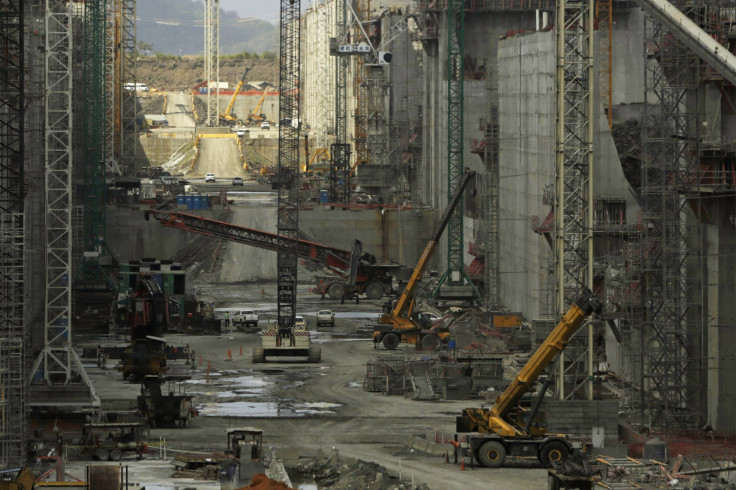Panama Canal Expansion Put On Hold For $1.6B Cost Overrun

Mere months from its 100th anniversary, the Panama Canal is facing some serious drama. The eagerly awaited expansion it has been undertaking since 2009 has come to a halt because of disagreements among contractor companies -- and it does not look like the issue will be resolved any time soon.
Animosity between the Grupo Unidos por el Canal (United for the Canal Group, or GUPC) -- the consortium of companies in charge of building the canal expansion -- and the Autoridad del Canal de Panamá (Panama Canal Authority, or ACP) has been brewing since late last year, when costs exceeded forecasts by $1.6 billion. The situation reached a point of no return on Jan. 1, when GUPC notified ACP that, should the authority fail to pay the extra by the 20th of the month, construction would stop.
ACP rejected the claims and the threat, which was followed by several negotiations between the parties and the delay of the deadline to Jan. 31, and then to Feb. 4, but the talks didn't resolve anything. The construction stopped on Feb. 5, with no restart date in sight.
“Both sides have been paralyzed, the Atlantic and the Pacific,” said Jorge Quijano, ACP administrator, in a televised interview. “The companies sent the workers home, and some were told not to come in in the morning.”
On the other side of the argument, the president of Spanish construction company Sacyr (MCE:SYV), a member of GUPC with the Italian Salini Impregilo SpA (BIT:SAL), the Belgian Jan de Nul and the Spanish Constructora Urbana, said that the consortium was willing to continue the negotiations.
“Even if construction has stopped, we want to keep on working,” said Manuel Manrique, president of Sacyr. He emphasized that the problem was exclusively about funds, not equipment or qualified labor.
Such qualified labor, which includes 10,000 engineers, planners and workers, is currently in danger of not working for an unspecified period. Their positions are secured and nobody risks losing his/her job, but they have no guarantees that they will be paid their wages at the end of the week.
“There is huge uncertainty regarding the restart of the construction,” said Norberto Valencia, a spokesperson for Panama's Sindicato Único de Trabajadores de la Construcción y Similares (Construction Workers Union, or Suntracs).
“The consortium said they would be paid and their positions are secure, but we will be watching,” he added. “If the promise is not kept, we will take action on the consortium and also the Authority.”
Valencia said that the ACP was ultimately responsible for the workers. GUPC insists that ACP needs to pay $50 million, agreed to in previous meetings, to pay the workers.
APC, on the other hand, said it is exempt from paying the bill because GUPC is listed as in debt with Panamanian social security. APC, as a state-owned agency, is not allowed, per national law, to pay companies with recorded debts with social security. “We need that debt to be met first, so we can pay the $50 million bill,” said Quijano.
GUPC blamed APC for breaking negotiations, putting the canal expansion in danger and leaving 10,000 jobs at risk.
Aside from the unpaid bill that puts the workers’ salaries in danger, the final cost of the expansion was larger than initial forecasts, for three reasons.
First, an unforeseen accumulation of mud had to be cleaned in order to continue with the expansion. That raised the bill by $120 million and delayed construction by weeks.
Second, ACP claimed materials recycled from the existing locks, like basalt, were good enough to reuse in the new ones. But when fractured, the basalt turned out to be unusable. Workers had to discard the unusable material and find new ones, which cost $497 million.
Third, the concrete needed for the locks had to have a guarantee of 100 years of durability, but there were no specifications as to how to check the quality of the material -- including the age of the concrete, which is an important factor since concrete’s impermeability and resistance get better as it gets older. GUPC passed the tests with a year-old concrete, but APC asked for the tests to be redone with younger material. The acquisition of new material and conducting new tests meant another $880 million.
The work to expand the Panama Canal for bigger ships to fit through the 100-year-old waterway were supposed to be finished by the canal's anniversary on Aug. 15, 2014. The project, which is currently 70 percent complete, is now in turmoil, leaving one of the world’s most vital shipping routes in jeopardy.
© Copyright IBTimes 2024. All rights reserved.





















